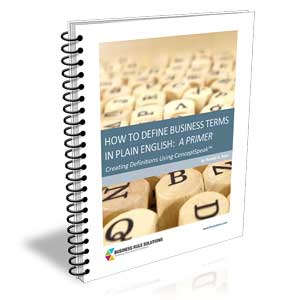What Knowledge Management is About (And What it Has To Do With Business Rules)
Summary:
What Knowledge Management is About (And What it Has To Do With Business Rules)
| This column originally appeared in the Sep./Oct. 1998 issue of the DataToKnowledge Newsletter. |
I spoke at the recent DBWorld event in Boston (sponsored by Digital Consulting, Inc.), which included a track on 'Knowledge Management' (KM). Armed with a list of specific questions, I attended as many of the KM sessions as I could. For the most part, the sessions confirmed what I already thought I knew, but the Q&A was fun and did yield a few new insights. Here are my questions, and a summary of the answers I came away with.
- Is KM simply a repackaging of artificial intelligence (AI)?
- No.
- Is KM simply a marketing umbrella for groupware products?
- In an unguarded moment, one well-known industry analyst called KM, "Lotus Notes on steroids." Yes, vendors will be vendors, but there is much more going on than that.
- Why do some people connect KM primarily to data warehouses?
- I don't know. I wouldn't.
- How does KM connect with 'business process' and BPR?
- I have found no better answer than Roger Burlton's. He says, "The performance of process is how you measure how good your knowledge is."
- Is KM a fad?
- Of course.
- Will KM outlast the fad stage -- or come and go, like CASE?
- How's your crystal ball? The answer ultimately depends on how good the technology is. (By the way, although the original CASE technology wasn't that good, 'CASE' products are still very much with us.)
- If KM fades, will the underlying business need disappear?
- No, it's here to stay -- big-time.
- Is there an accepted definition for KM?
- Tracey Leighton of PeopleSoft asked attendees at her session for definitions.
The rapid-fire responses were excellent. Here are the ones I was able to take
down.
- Organizing the process of capturing and leveraging enterprise knowledge, in order to further business strategy.
- Creating an environment that recognizes the value of people, and to encourage that recognition by respecting and rewarding it.
- Organizing knowledge to get the right answers the first time, every time.
- Utilizing tools to achieve the above.
- Changing corporate culture to encourage the sharing of knowledge, by allocating power to those who share rather than to those who hoard.
- Enabling lower-level staff to answer questions as correctly as the most knowledgeable people in the enterprise.
- Enabling actors outside the company to answer questions on their own.
- Answering every question well, even if the person asking it doesn't know how to ask it right.
- Integrating problem-solving skill sets, for the purposes of all the above.
- Who are the early adapters?
- There seems to be general agreement with the views of David Coleman of Collaborative Strategies, who offered the following. Functionally, early adapters fall into three major categories: sales and marketing, customer support, and R&D. Industry-wise, there are four major categories: high-tech, financial services, pharmaceuticals, and telco.
- Where have the early successes been?
- Call centers and help desks, for the most part.
- Where do the hot new applications lie?
- Self-service and Internet.
- What is the common challenge in analysis and design across the entire spectrum of applications?
- I believe it is creating structured dialogs, which have several essential features.
First, human intervention should be keep to a minimum. Second, everything is
subject to rapid change. Third, the dialog must be 'smart'. A 'smart'
dialog is characterized as follows.
- The right question is asked at the right time.
- Suggestions and heuristics appear automatically at the optimal points.
- Non-viable options, alternatives, and/or conclusions are eliminated as soon as possible.
- Opportunistic questions (e.g., for cross-selling) are inserted dynamically.
- Are there well-structured analysis techniques to support this?
- Decision-trees seem to be about it. I haven't found any new ones yet. (That doesn't mean they don't exist. Remember this is a consultant-intensive field, so there may be proprietary ones.) But there seems to be a big gap here.
- How does KM connect to business rules?
- Consider what the two major arenas of applied KM have in common. For workers inside the company, you want to codify the knowledge of the company's best people and make it available to workers at lower levels. ('Lower' here generally means 'lower cost'.) For customers and others outside the company, you want to codify what the 'middlemen' know, and to reduce or eliminate their involvement. (This falls under my favorite new buzzword, 'disintermediation'.) In either case, you must codify the knowledge. That means business rules, pure and simple.
- Can rule engines play a role in KM?
- That's crystal clear. There's a huge opportunity. Consider that the last three of the four characteristics of smart dialogs (above) could be rule-based. Is there any better technology to accommodate rapid change? No!
- What is knowledge?
- I'll leave that one for others to answer. But I do know this much. Those parts of enterprise knowledge you can codify are business rules -- nothing more, and nothing less.
# # #
About our Contributor:
Free How-To-Primers
In The Spotlight
Online Interactive Training Series
In response to a great many requests, Business Rule Solutions now offers at-a-distance learning options. No travel, no backlogs, no hassles. Same great instructors, but with schedules, content and pricing designed to meet the special needs of busy professionals.










How to Define Business Terms in Plain English: A Primer
How to Use DecisionSpeak™ and Question Charts (Q-Charts™)
Decision Tables - A Primer: How to Use TableSpeak™
Tabulation of Lists in RuleSpeak®: A Primer - Using "The Following" Clause
Business Agility Manifesto
Business Rules Manifesto
Business Motivation Model
Decision Vocabulary
[Download]
[Download]
Semantics of Business Vocabulary and Business Rules